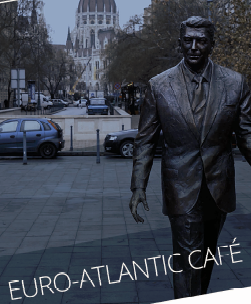
17 Sep Transatlantic relations in the presidential election – EAC event summary
The first online event of the Euro-Atlantic Café after the restart was titled ’Transatlantic relations in the presidential election – Is Europe still important?’ and it took place on September 10, 2020.
Our two panelists were renowned experts of the Transatlantic ties, therefore, the debate was very lively and touched upon the most important aspects that can be expected to be significant in the run-up to and after the presidential election. John Glenn, the policy director of the U.S. Global Leadership Coalition, and Dávid Korányi, senior fellow of the Atlantic Council and the senior advisor to the Mayor of Budapest on city diplomacy shared their views and opinions moderated by Edit Inotai, senior fellow of CEID.
Just two months before the presidential election, the main topics of the panel were the following: the state of the atmosphere and the political climate in the U.S., foreign policy’s role in the campaigns, whether the damages that have been dealt to the relations are irreparable, is the rift more in the content or the rhetoric, the „homework” of the EU and Central Europe, what a potential Biden presidency could mean in the State Department, and what is to be expected from a possible Trump reelection.
According to John Glenn, the current state of affairs resembles nothing like a presidential election in the United States, “it’s like there are two totally different campaigns at once”, two alternative worlds running parallel. Foreign policy in its traditional sense is not playing an important role in the public discourse, the focus is much more on the fundamental questions about America’s global role. As far as he is concerned, trust is much less of an issue currently than credibility between the two sides of the Atlantic, “If there is a trust problem, people take a walk together and talk”. The intentions of the U.S. should be signaled appropriately to work with Europe, even when that is the smallest part of the problem – concrete projects should be found that can demonstrate results in a cooperative way. Regardless of what the result of the election will be, the issues that the next president will face on January 1, 2021 will be the same: China, Russia, trade and economic diplomacy, and, of course, the global pandemic. The question is whether we will be able to cooperate more on the pandemic to have a safer environment, will we be able to address the economic crisis we face together, can we find areas where we can recognize some symbolic values as Europe and the U.S. Concerning a possible Trump reelection, the tradition has been that the second term must be seen as a potential opportunity for new players, new policies, a new approach, however, with the Trump administration it is very difficult to imagine anything else than more of the same. As for Russia and China, if there is a change of administration, a rethink of the relationship with the Chinese counterpart very well can be imaged, but this is not the case with Vladimir Putin’s Russia, with which the current relations are also “schizophrenic” enough – seemingly good personal relations, while continuously mounting pressure with more sanctions. It has to be accepted that the U.S. and Europe might see their own respective ties with these Eastern powers differently, there is simply nothing wrong with that – Chinese investments can be beneficial, but only with certain rules and norms accepted and upheld in the process.
As far as Dávid Korányi was concerned, much of Europe is expecting a Biden triumph in November, he has always been a “staunch Transatlanticist”, has close political ties with the incumbent European leaders, but, for instance, the expectations vary greatly between the particular European countries and their respective capitals, especially in the Central European region. The EU has to make a great impact on how the Transatlantic relationship will be reappraised, and developing the much needed strategic EU autonomy would be greatly beneficial in this question. Mr. Korányi is not sure whether the 2% NATO threshold is the right benchmark in the 21st century and neither the existing international nor the Transatlantic system can be fundamentally reformed without common initiatives. Concerning the “mavericks”, such as Hungary and Turkey, the realization has to be made that the alliances they are part of are value-based ones at the end of the day, so some sort of change has to come eventually. Mr. Korányi believed that the issue of 5G is “the litmus test” of the cooperation with China, as it cuts to such deep security concerns that he expects increasing pressure on European countries not to go forward with Chinese technology. Should Donald Trump remain the U.S. president, Mr. Korányi doesn’t expect widespread conflicts or wars, rather continuation of the steady erosion of global order and American dominance, and this could potentially accelerate the cohesion within Europe as a whole.
The pre-study for the event, prepared by former CEID director Dániel Bartha, can be read here, while the whole discussion can be rewatched in the embedded Facebook post.
The Euro-Atlantic Café event series is supported by the U.S. Embassy Budapest.

